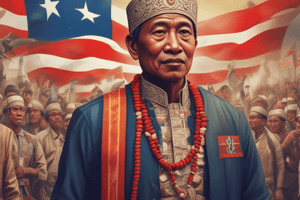Podcast
Questions and Answers
Pancasila memiliki peran apa dalam pembentukan negara Indonesia?
Pancasila memiliki peran apa dalam pembentukan negara Indonesia?
- Sebagai kebijakan luar negeri
- Sebagai landasan hukum nasional
- Sebagai dasar filsafat politik (correct)
- Sebagai ideologi resmi pemerintah
Siapa yang mengembangkan prinsip-prinsip Pancasila?
Siapa yang mengembangkan prinsip-prinsip Pancasila?
- Sutarjo, pejuang kemerdekaan
- Mohammad Hatta, wakil presiden pertama Indonesia
- Soekarno, presiden pertama Indonesia (correct)
- Ki Hajar Dewantara, pejuang kemerdekaan
Dalam konteks apa Pancasila dikembangkan?
Dalam konteks apa Pancasila dikembangkan?
- Dalam konteks perjuangan kemerdekaan dan pembentukan negara baru (correct)
- Dalam konteks kebijakan luar negeri
- Dalam konteks pengembangan ekonomi nasional
- Dalam konteks pembangunan infrastruktur
Apa yang dijamin oleh Pancasila sebagai landasan konstitusional?
Apa yang dijamin oleh Pancasila sebagai landasan konstitusional?
Kapan Pancasila diakui sebagai dasar negara?
Kapan Pancasila diakui sebagai dasar negara?
Apa yang dikukuhkan oleh Dekret MPR No.XVIII/MPR/1998?
Apa yang dikukuhkan oleh Dekret MPR No.XVIII/MPR/1998?
Apa yang diartikan oleh kata 'panca' dalam Pancasila?
Apa yang diartikan oleh kata 'panca' dalam Pancasila?
Apa yang diyakini sebagai tujuan nasional dalam Pembukaan UUD 1945?
Apa yang diyakini sebagai tujuan nasional dalam Pembukaan UUD 1945?
Bagaimana peran Pancasila dalam sistem pemerintahan Indonesia?
Bagaimana peran Pancasila dalam sistem pemerintahan Indonesia?
Apa yang dimaksud dengan 'Basis of the State'?
Apa yang dimaksud dengan 'Basis of the State'?
Dalam konteks sejarah, apa yang terjadi pada tahun 1945?
Dalam konteks sejarah, apa yang terjadi pada tahun 1945?
Bagaimana Pancasila mempengaruhi kehidupan sehari-hari?
Bagaimana Pancasila mempengaruhi kehidupan sehari-hari?
Flashcards are hidden until you start studying
Study Notes
Pancasila as the State's Foundation
Pancasila is a foundational ideology for the Indonesian nation, consisting of five principles that form the basis of the state's philosophy. It is a term derived from two Sanskrit words: "panca," meaning five, and "sila," meaning principle. These principles are not only a source of law in Indonesia, but also serve as a guide for daily life, aimed at promoting unity, justice, and prosperity among Indonesian citizens.
Constitutional Role
Pancasila was affirmed in the Preamble of the 1945 Constitution of Indonesia, which states that the nation should be formed with the objective of protecting the entire Indonesian nation and advancing the general welfare, while educating the nation's life and participating in carrying out world order based on independence, lasting peace, and social justice. This constitutional recognition has established Pancasila as the philosophical basis of the Unitary State of the Republic of Indonesia, often referred to as the "Basis of the State" or the "Philosophical Basis of the State".
In this capacity, Pancasila values are used as a foundation for regulating the administration of government and are seen as a tool for unity and social justice among citizens. The principles of Pancasila are applied to various aspects of life, including education, social norms, and economic and legal structures, serving as a shared set of values that guide the nation's development.
Historical Context
Pancasila was developed in the context of Indonesia's struggle for independence and the creation of a new nation. The principles were formulated by Sukarno, the first president of Indonesia, and were influenced by various sources, including Indonesian, European, and Asian philosophical and political ideas. The principles were intended to provide a basis for national unity and stability, as well as to guide the nation's development towards a prosperous and just society.
Pancasila's role as the state's foundation has been recognized since Indonesia's independence in 1945. It was affirmed in the Preamble of the 1945 Constitution, and its importance was reaffirmed in the Decree of the People's Consultative Assembly No. XVIII / MPR / 1998, which confirmed Pancasila as the basis for regulating the administration of government.
In summary, Pancasila is a foundational ideology for the Indonesian nation, serving as a constitutional basis for the state's philosophy and guiding principles for daily life. Its historical context and development reflect the nation's commitment to unity, justice, and prosperity, and its role in shaping Indonesia's political and social landscape continues to be significant today.
Studying That Suits You
Use AI to generate personalized quizzes and flashcards to suit your learning preferences.




